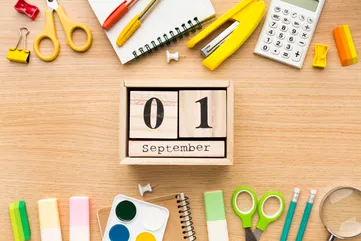The Parent Bit

_21o241.webp)

%20(1)_ZzIRX9.webp)



Fear-Setting: A Stress Management Tool for Kids
Fear-setting is an extremely helpful tool for adults and children alike to learn to identify their fears and to separate what can be controlled from what cannot. By focusing on what is in our control, and taking action, we can decrease emotional reactivity and stress.

How Trying Different Hobbies Can Benefit Your Kids
It has long been debated whether early specialization or sampling (allowing children to try an array of hobbies and sports) is more effective in setting kids up for success in any given area. Angela Duckworth explains that “young people thrive when given the freedom to explore a wide array of interests without an obligation to stick with any of them.”

Family Dinners Improve Kids' Grades and Happiness
Research indicates that eating communally as a family unit is becoming less and less common, especially in the US. Only 30% of American families share meals regularly and the average family shares a meal less than five days a week.

Believe It or Not, Stress Can Be Positive for Your Child
How we respond to stress and anxiety gives us a degree of control over how we allow it to affect us and alter our well-being. This is thanks to neuroplasticity - the brain's ability to change. We can transform anxiety into something useful by changing our thinking and taking practical steps to work through anxiety rather than avoid it.

Swap Scrolling with Reading: 4 Benefits of Reading
In a world where scrolling has become the default “break,” our kids are missing out on one habit that boosts creativity, focus, and well-being: reading. Here are four powerful reasons to swap a little screen time for reading.

A 5-Step Guide to Emotional Agility for Kids
Susan David, Harvard Medical School Psychologist and bestselling author of Emotional Agility, describes the concept as the ability to mindfully navigate positive and negative emotions.
_h7GvE.webp)
Dealing with a Bored Kid? It's Actually Good for Their Brain!
Boredom has an evolutionary purpose and is critical for brain health. A Northeastern University study found that during periods of mind-wandering, our brain networks are more active than ever. "Virtually the whole brain was involved", said Kuyci. So what are our brains doing while we are bored and why should we start embracing boredom?
_Zn0YYX.webp)
Science Explains Why Your Teen Won’t Listen to You: 4 Ways to Respond
A Stanford School of Medicine study shows that the teenage brain is wired to ignore the sound of their parents' voices in favor of unfamiliar outside voices. During adolescence, teens are biologically seeking independence, a period which can be scary and frustrating for parents.
_Z2dC98e.webp)
Cold Showers Are Good For You and Your Kids
When our body is exposed to cold, a stress response is triggered and as a result a cocktail of neurochemicals. These neurochemicals are responsible for initiating, directing, and sustaining focus. Cold exposure has a significant effect on cognitive performance, specifically in terms of enhancing focus and attention.
_f1nSk.webp)
Rethinking ADHD: The Misunderstood Symptoms of ADHD in Teen Boys
Teenage boys are more than twice as likely to be diagnosed with ADHD than teenage girls. This is likely because the way that ADHD most commonly shows up in boys is external, disruptive, and obvious. But that isn't always the case.
_Z1T8A9c.webp)
Is Your Child Displaying ADHD Symptoms? Take Our ADHD Test to Find Out!
It's quite common for kids and adolescents to get distracted in class or forget to turn their assignments in on time. But how do you know if your teen is dealing with the difficulties of adolescence or if their behaviors are a sign of a learning or neurodevelopmental disorder?

Using your HSA/FSA Benefits for ADHD Coaching: A Parent's Guide to Affordable Support
Finding affordable ADHD support for your child can be challenging, especially when insurance doesn’t cover coaching. That’s why many parents are turning to Health Savings Accounts (HSAs) and Flexible Spending Accounts (FSAs) to make high-quality ADHD coaching more accessible. In this guide, we explain how HSAs and FSAs work, what ADHD-related services they can cover, and how Coachbit’s partnership with Flex makes using your benefits simple, stress-free, and affordable.

Vitamin Connection: Kids With ADHD Need Community
Many children with ADHD, and other learning difficulties, feel different, alienated, and misunderstood. Vitamin Connection, or what Hallowell and Ratey call 'Psychosocial integration' is the antidote. It is a warm and safe environment that ought to be created at home, at school, and in organizations.
_2rxjp3.webp)
Kids With ADHD Are At Risk for Depression: 4 Tips To Promote Their Mental Well-Being
Constantly dealing with the demands and frustrations of ADHD can take a toll on a child's emotional well-being. Around 25-30% of children with ADHD also suffer from anxiety, and 17% of children with ADHD from depression. These numbers highlight the importance of proper support for kids with ADHD's mental well-being.
_Z15ewEP.webp)
Pencil Power: Drawing as a Natural Treatment for ADHD in Kids and Teens
Drawing is another easy activity kids can do at home with little effort. Drawing requires fine motor skills, precise movement, timing, and coordination like balance. When kids draw, their cerebellum is activated. By practicing drawing, they can improve their fine motor and executive functioning.

Balance Exercises: An Alternative Treatment for ADHD
Dr. Jeremy Schmahmann, Professor of Neurology at Harvard Medical School, was one of the first to suggest that issues in attention could be linked to the cerebellum. This was initially a surprise to brain scientists who had long known the cerebellum to control balance and coordination in the body.
_Z28B9Xm.webp)
The Hidden Struggle: Why ADHD in Teen Girls Goes Undiagnosed and Untreated
According to the Centers for Disease Control and Prevention, boys are three times more likely to receive an ADHD diagnosis than girls. Why? For many years, ADHD has been perceived as a ‘boys' disorder.’Girls have ADHD - their symptoms look different from those of boys. Because of this, girls aren’t being diagnosed and aren’t receiving proper treatment.
_2su0xn.webp)
The 6 Best Study Skills for ADHD Teens
Many kids with ADHD and executive functioning deficits face challenges when it comes to schoolwork and studying. An average of 50% of teens with ADHD repeat a grade by adolescence. Unfortunately, most schools do not equip ADHD students with helpful study skills and strategize to address these challenges.
_S3ttf.webp)
Have You Heard of BDNF?: The Super Molecule of Learning
The benefits that BDNF has to offer are extensive. For those who struggle with learning and attention, such as children and adults with ADHD and other learning difficulties, tapping into the goldmine of potential that BDNF has to offer can be extremely beneficial.

4 Ways to Boost Motivation in Kids with ADHD
As a parent, have you ever wondered: How do I get my kids to do what they're supposed to do when they're supposed to do it? That was a rhetorical question, we know you have!

4 Steps to Teenage Habit Building
It's never too late to learn new habits, or unlearn old ones. According to Professor Laurence Steinberg, a leading expert on adolescent psychological development, between the ages of 12 and 25, our brains are most plastic.

4 Healthy Sleep Habits For Teens
As parents, it’s easy to worry that our teens are sleeping far too much or that they only make their way out of their bedrooms in the afternoons on weekends. If this rings true to you, I urge you not to be too concerned.

The Benefits of Morning Meditation For Kids and Teens
A 2019 study published in the International Journal of Social Science and Economic Research explored the effect of meditation on the achievement, attention, and memory of high school students. The study found that those high schoolers who practiced meditation showed improved memory and greater attention spans.
%20(1)_Z11v7sr.webp)
4 Healthy Habits To Set Your Teen Up For Life
Adolescence is the best time for habit formation. Why? The teenage brain is undergoing rapid changes in its structure. This process is called neuroplasticity. It's a big word for a simple process - the brain is changing and learning as it goes.This means it's easier to learn and form new habits when we are teenagers compared to later stages of life.

Is My Child Experiencing Burnout? How to Spot and Prevent Academic Burnout in Teens.
Halfway through the school year is the perfect time to check in on your child’s well-being. This article explains what academic burnout in teens looks like, how to spot early warning signs, and practical ways to prevent burnout by building healthy routines, coping skills, and support systems at home and at school.

A Science-Backed 3-Step Morning Routine for Kids
We have done the research for you and tapped into the latest studies in neuroscience to develop a simple and actionable morning routine proven to boost cognitive function, performance, and overall mood.

Rewiring Your Brain: The Simple Gratitude Habit That Changes Everything
Ever notice how one negative comment can stick with you longer than a dozen positive ones? That’s your brain’s negativity bias at work — a built-in survival mechanism that once kept us safe, but now often fuels anxiety and stress. The good news? You can retrain your brain to focus on what’s going right. Practicing gratitude doesn’t just make you feel better in the moment; it actually changes your brain, strengthening pathways associated with calmness, positivity, and resilience. In this article, we’ll explore how gratitude rewires the mind and share simple, research-backed ways to make it a daily habit for you and your teen.

The Benefits of Exercise for Kids
Exercise has many positive effects on learning, brain health, and mental health. That's why it is essential for adolescents whose brains are developing rapidly. School or extracurricular sports are a fun, social, and competitive way to introduce exercise into teenagers' routines.
_Z5TrlU.webp)
The Best Morning Routine for Your Child: 3 Tiny Habits With a Big Impact
As the new year begins, there's a temptation to overhaul your child's routines. However, introducing too much change at once can overwhelm them and prove unsustainable. Success lies in gradually introducing tiny habits. The sense of accomplishment from completing morning tasks sets a positive tone for the day, fueling momentum for further challenges. Here's how you can start!

Finding Order in the Chaos – Setting up Calendars for Kids
It can often feel as if there just aren't enough hours in a day. Kids have a lot on their plates: balancing school, homework, extracurriculars, hobbies, and finding time for friends. Without effective time management tools, managing their daily lives can become overwhelming.

5 Goal Setting Principles to Motivate Kids
Research into goal-setting has suggested that there is a right and a wrong way to go about setting goals. By improving the way we set our goals and the systems we put in place to achieve them, we can increase our chances of actually succeeding.
_2AwTJ.webp)
3 Ways an Executive Functioning Coach Can Help Your Child
Many kids and teens struggle with executive functioning skills, and most traditional schools do not offer the training and support required to improve them. A coach can help your child develop the practical skills necessary to navigate these challenges.

Is my teen procrastinating, or is it something deeper? The difference between procrastination and executive function
Is your teenager "doing nothing" because they're avoiding discomfort, or are they genuinely stuck because their brain can't organize the steps? It's a question every parent asks, and the answer is more critical than you think. What looks like simple procrastination could actually be a sign of executive dysfunction, and the support that helps one can make the other much worse. In this essential guide, we break down the key differences between procrastination and executive dysfunction, offer clear signs to help you identify the barrier, and give you practical, tailored strategies to finally help your teen move from 'stuck' to 'starting.' Stop the pressure and start the progress.

3 Tips to Help Your Child Focus on Homework
Adolescents (ages 10 to 19 years) are at an age where their brains are primed to learn and take in information rapidly, but their brains are also incredibly prone to distraction. By understanding why kids are so easily distracted, we can better assist them in achieving focus and harnessing their brains’ learning superpowers!

How Meditation Boosts Creativity and Focus in Kids
A 2019 study found that high-school students who practiced meditation had greater attention spans than those who did not. Another study led by Patricia Broderick, Assistant Research Professor at Penn State University, highlighted the effect of meditation and mindfulness on the well-being of adolescents.
_Z2bR53f.webp)
Study Skills for High Schoolers – Mastering Note-Taking
Effective study strategies and tools are vital to supporting high schoolers in their learning, focus, and understanding of their school subjects. There are many study strategies worth trying, each with its own unique benefits.

Metacognition: Reflective Learning Can Help Kids Perform Better
In 1928, Margaret Mead, an American Cultural Anthropologist, was famously reported saying, "Children should be taught how to think, and not what to think." It turns out she was way ahead of her time and was already tapping into a theory that educational psychologists would later term 'Metacognition'.

Deep Play Helps Teenagers Learn
Play is inherently fun, but serves a far greater evolutionary purpose than just entertainment. That's why the act of play activates the nucleus accumbens - the reward center of the brain. Its by-products, learning, creativity, social connection, and problem-solving, were critical to the evolution of our ancestors.

Try 'Deep Focus' to Help Your ADHD Child Focus
When it comes to attention spans, teenagers have it even worse than us. The average teenager has an attention span of approximately 35 minutes. Pre-teens, younger children, and ADHD teens have even less than that. This is why hours of studying or homework, without structure or breaks, are rarely successful or sustainable.
_2su0xn.webp)
The 6 Best Study Skills for ADHD Teens
Many kids with ADHD and executive functioning deficits face challenges when it comes to schoolwork and studying. An average of 50% of teens with ADHD repeat a grade by adolescence. Unfortunately, most schools do not equip ADHD students with helpful study skills and strategize to address these challenges.
How many core habits and
skills is your child missing?
Take our short quiz and find out.
Take our quiz
_Z2kXnCA.webp)

